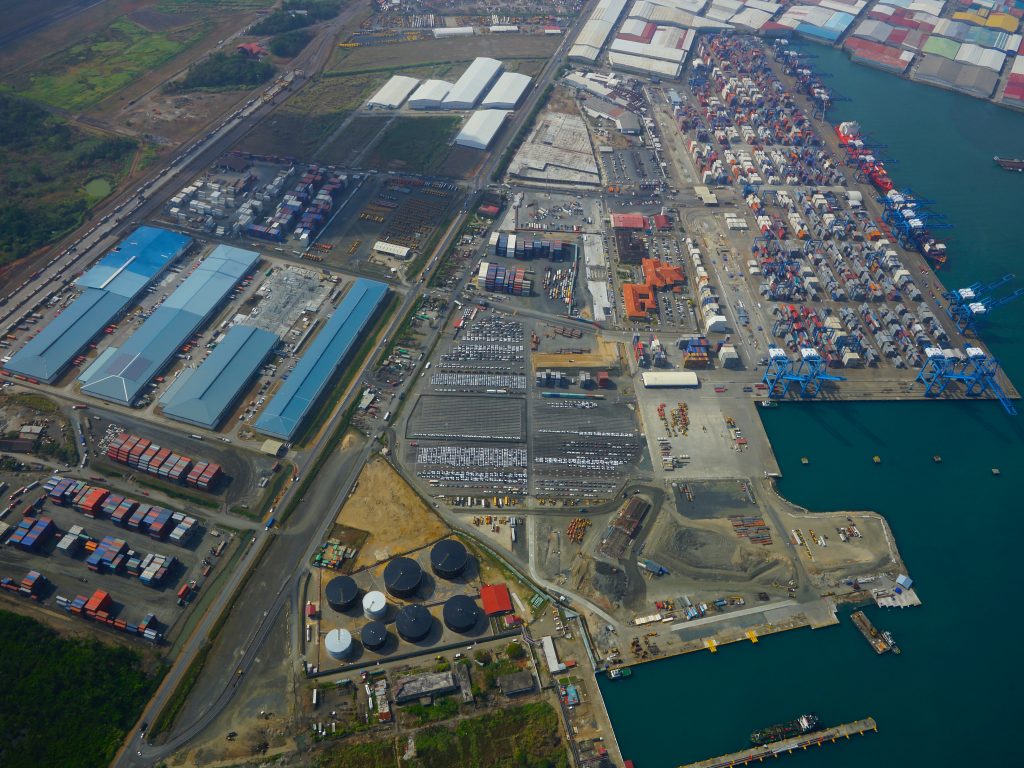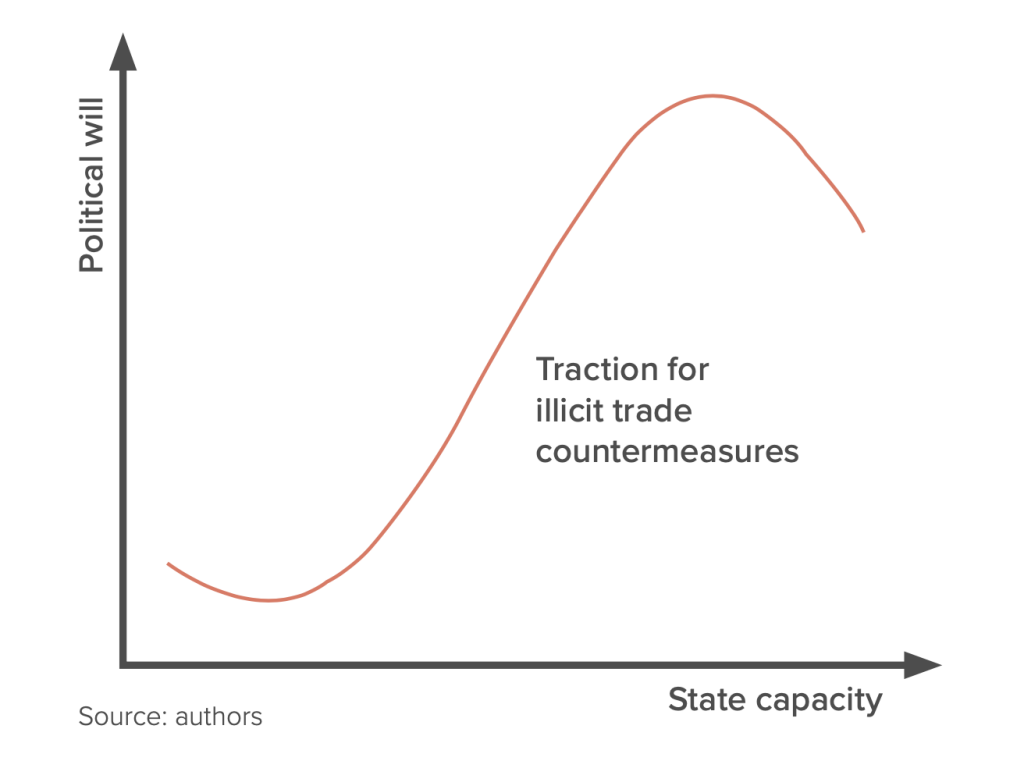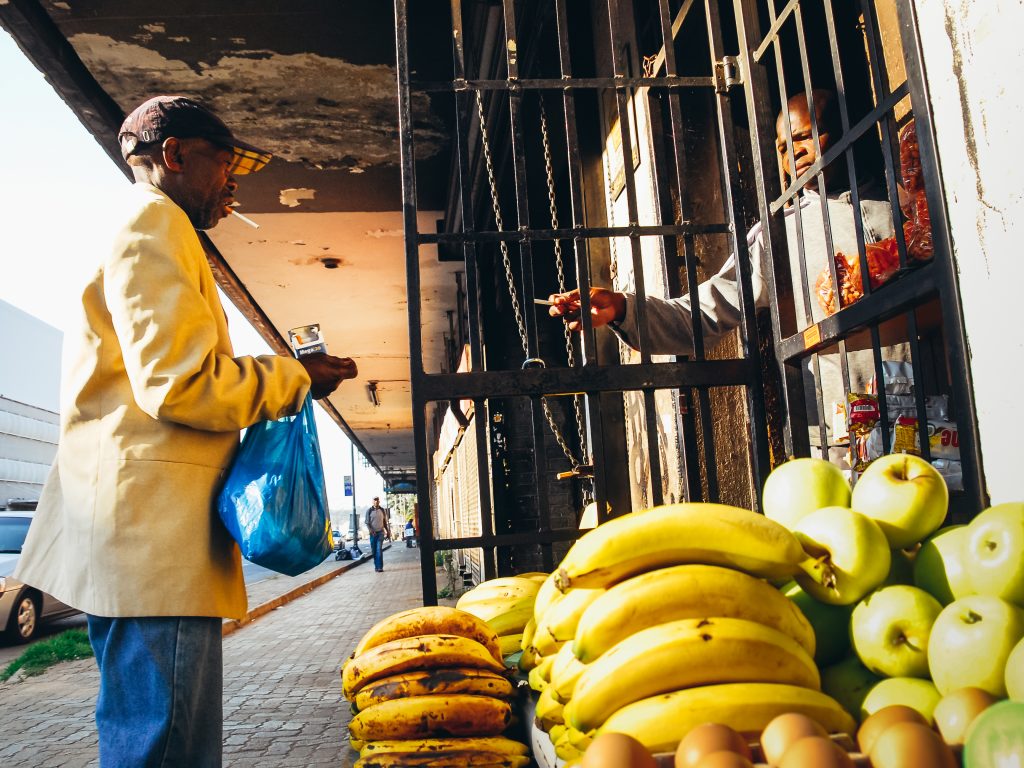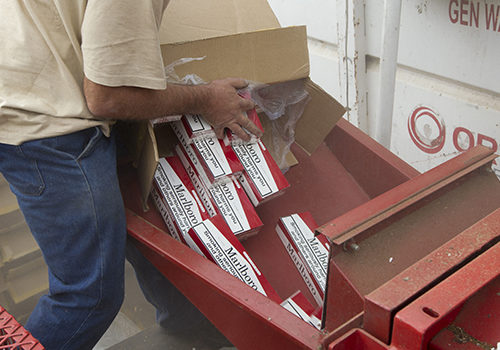October 23, 2020
States on the cusp: Overcoming illicit trade’s corrosive effects in developing economies
The report “States on the cusp” explores the complex ways in which the illicit trade in otherwise licit goods (including alcohol, pharmaceuticals, luxury goods, cigarettes, electronics, and much more) threatens the stability, security, and prosperity of vulnerable states around the world, especially in the Global South. This groundbreaking study at the nexus of illicit trade, organized crime, and official corruption proposes actionable solutions for combating illicit trade and bringing states back from the cusp of functionality.
Executive summary
Illicit trade is an umbrella term that covers multiple crimes and commodities, including the theft, diversion, adulteration, counterfeiting, and production of substandard goods, all acts which can occur at multiple points along a supply chain. It is initiated, enabled, and protected by a wide range of actors, from unethical corporations and corrupt officials at all levels of government to armed violent groups in conflict zones and organized crime networks operating locally and transnationally.
As global trade routes increasingly encompass developing economies—as a source, transit, and market for consumer goods—they present unique challenges to creating effective national and, by implication, regional and global regimes against illicit trade. For many states around the world, and especially in the Global South, these challenges threaten to destabilize social, economic, and political structures. These states are the world’s “states on the cusp.”
One of the central challenges of our time, one that is growing year on year, is how to manage normally legal goods, traded illegally across national boundaries.
The term illicit trade, for the purpose of this report, refers to illegal production, movement, or sale of normally legal goods. Such illegal movement is often carried out to derive profit by avoiding costs such as those imposed by taxes or customs duties. There is a particularly strong incentive for illicit trade in cases where goods are subject to high duties, or where goods are subsidized to be cheaper in one jurisdiction (food, sugar, and flour are examples) but not in another, providing incentives for illegal cross-border trade. The phrase “licit goods traded illicitly” captures this phenomenon neatly. Importantly, however, this definition also includes some goods that are counterfeited to pass off as being licit, and then traded either illicitly (avoiding scrutiny) or, on occasion, in legal markets.
The trade in counterfeit goods alone has been estimated to be worth between 3 and 7 percent of global GDP. Many forms of illicit trade, including counterfeit medicines, substandard goods, and the falsification or adulteration of food and agricultural commodities, medical equipment, and consumer and industrial goods have serious public health and safety implications. Other forms of illicit trade have huge environmental, social, and economic impacts, not least of which is reduced revenue collection which weakens state institutions, creating a downward spiral of higher illicit trade intertwined with weaker state capacity.
Reversing this trend, therefore, must be a global public good.
This complex mix of products and commodities being traded illegally raises the important question of whether advances in technology can assist in more effective regulation. At the core of these efforts is ensuring that commodities are both produced and traded legally to protect consumers from harm. Here, “harm” refers to harms to the public (arising from poor quality or counterfeit products) and to the state (such products harms the state’s ability to collect essential revenues and to control markets in accordance with democratic processes).
Global economic trends in international trade and ever more complex supply chains are, however, reducing the role that governments can play in monitoring and regulating trade, creating both greater vulnerabilities and increasing the importance of the private sector as a critical actor. This poses significant new challenges. With an estimated 80 percent of global trade travelling by sea, the trend toward the privatization of ports and other critical infrastructure and the proliferation of free trade zones have created a growing blind spot for governments seeking to understand and regulate supply chains and illicit trade. For some forms of illicit trade, the role of small air shipments through private carriers has had a similar effect, eroding law enforcement’s ability to monitor, predict, and interdict where and how illicitly traded goods will reach the hands of their consumers. Online marketplaces and small package shipping are replacing the physical spaces where illicit transactions used to take place; their market size and reach are expanding while at the same time reducing the stigma of illegality.
In short, the scope for illegality is growing, just as the capacity for states to respond is weakening. Can advances in technology fill the gap?
Sophisticated and rapidly evolving technologies are bringing new ways to track, trace, monitor, and maintain records with integrity. They are steadily reinforcing law enforcement’s capacity to identify criminality in the vastness of the surface and dark web. Despite the promise that technology has to offer, some longstanding stumbling blocks need to be overcome. Some of these are particularly acute in developing economies. At the most basic level, for example, no system can provide quality control over data entry when those responsible for entering the primary data are either willfully or through lack of capacity corrupting that content.
More generally, the lack of global standards and effective and consistent legal frameworks, and, increasingly, questions about jurisdiction caused by cyber-enabled trade and global supply chains, may limit the impact of purely national regimes of oversight and enforcement regimes.

Lack of capacity, insecurity, and multiple forms and levels of corruption are pertinent features of developing economies that compound the inherent challenges of responding to illicit trade. Evidence from case studies around the world, as well as two commissioned for this report—examining the political economy of illicit tobacco in Southern Africa and of counterfeit medicines in Central America—reveal that political actors and state institutions are complicit in enabling, promoting, and protecting illicit trade at the very highest levels of the state. They also show that it is often the most vulnerable and underserved in society who rely on illicit markets to meet basic needs.
While there are clear distinctions by commodity and context, the perpetuation of illicit markets and trade within developing economies often can be exacerbated by systematic and serious failures in governance and political will, rather than technical shortcomings that can easily be overcome. Technical solutions also may have unintended consequences for governance and the poor. That does not mean that they should not be used, but rather that a better understanding of the economic, political, and social context in which they are implemented is desirable. Implemented effectively, they hold great promise in taking forward steps to undercut illicit markets and improve citizens’ well-being.

However, the changing landscape for infrastructure, investment, and development assistance also has reduced the leverage of more traditional multilateral institutions to insist upon the governance and policy reforms that would address these issues. These changes have had contradictory outcomes: increasing trade on the one hand but weakening regulatory systems and conditionalities (that had been a growing part of traditional multilateral development bank practices) on the other. Requirements for transparency, broad-based development benefits for the citizenry, or democratic governance have been weakened, although not removed, in the new financing landscape.
Against this backdrop, private sector innovation for providing technology-based tools to enhance regulatory capacity combined with citizen empowerment is key. Such innovations, however, should be grounded in an understanding of the context into which they are introduced and be governed by effective oversight systems, including effective and transparent public-private partnerships.
How to address illicit trade in developing economies, therefore, remains unsurprisingly complex. Wins often will be incremental and setbacks frequent. The overall goal simply may be to constrain the enabling environment for illicit trade rather than allowing it to endlessly expand, to target efforts where they have the greatest chance of sustained success, and to prioritize those commodities where the harmful implications are the greatest.
This is a volatile time in global history, marked by rapid technological and political changesplus a global COVID-19 pandemic. We must develop a better understanding of the political economy of illicit trade and craft an active monitoring capacity for intervenening. In this report, we put forward a commodity- and context-specific political economy approach to achieve this and conclude with some guidance for policy makers from any sector, public or private, to assess when and how to respond to illicit trade, and to work in and with developing economies.
This study offers five key principles in conclusion:
1. Be commodity specific at the global level
As the nature of illicit trade differs according to commodity, its industry, and the interests of key stakeholders, the solutions required to combat it differ. Some commodities are more suited to coordinated efforts, including those with a humanitarian or moral imperative (the greater the harm, the greater the imperative to act).
Yet there is considerable divergence on what goods should be prohibited, pronounced differences in quality standards, and issues of property rights and penalties, often occurring as fault lines between developing and developed economies. The harmonization of laws and the coordination of enforcement efforts benefit from a global approach. Segmented approaches do not consider the problem’s interconnectedness nor points of convergence.
2. Be context specific at the local level
The illicit economy reality from one locality to another can differ sharply. Knowing the local context and finding solutions and innovations that are tailored to that local context and that account for the perceptions, attitudes, and impacts on the local population is important. A clear understanding of the underlying causes, political dimensions, and network structures of illicit trade, as well as the links between national and local power holders, will support the design of effective strategies and programs to counter illicit trade. Citizens’ views on acceptable and intolerable practices matter and must be considered, and perhaps moderated, if interventions are to be achieved.

In many developing economies, the state is unlikely to be a trusted interlocutor. Criminal groups providing the commodities may have a higher degree of legitimacy in some localities than the state. Civil society may be a better spokesperson and communicator than the state.
3. Consider the operational implications
Developing countries have operational challenges, which may undermine illicit trade solutions, ranging from inability to bear financial costs to poor connectivity and infrastructure, and low staff skill sets (e.g., technology familiarity).
Poorly designed or overly complex solutions may hinder progress. For example, many systems are not set up for consumers and end users, require specialized technology, or produce data that users cannot process in a meaningful way. Although officials can face an overwhelming number of different systems, integrated systems can offer unified platforms for interoperability across scanners, handheld devices, and information systems. Overlapping jurisdictions offer a fundamental challenge: disentangling, simplifying, and coordinating agencies’ use of solutions ought to be prioritized.
4. Plan for independent oversight
Governments need to plan for independent oversight. Although there are several options, effective oversight mechanisms generally need three things:
- Independence: The ability to operate free from the influence of the parties they are monitoring, as well as from political interference;
- Resources: The financial and human resources to properly perform their function—to visit sites, to investigate, and to issue public reports;
- Power: Some capacity for enforcement, including publication of credible reports to leverage public opinion, plus the support of a criminal justice or financial penalty process to sanction contravention.
5. Target comprehensive reform, not quick fixes
Broad and holistic strategies are required to respond to what is often a global challenge, not just a regional or national one. Solutions are unlikely to be successful in isolation, and fragmented approaches are more easily undermined. Ideally, interventions (including technological interventions) are combined with other economic, social, governmental, and enforcement activities.
Responses need to address: corruption fueled by illicit trade, underworld links between industry and individuals, the broader costs to the state due to illicit practices, and stopping misinformation about illicit trade.
Policy makers’ agenda should be about coalition-building: step-by-step approaches to overcome one vested interest at a time. Doing so might enable a “state on the cusp” to avoid one possible outcome of big bang comprehensive reform efforts, which is the potential for powerful opponents to coalesce quickly against an overt and aggressive agenda, thereby killing it.
Related content
Sign up for the Foresight, Strategy and Risks newsletter to remain up to date with our events, publications, and much more! Learn about global risks, technology, emerging security issues, and geopolitics, and discover how current events fit into long-term trends.
Image: KENYA, Mombasa: Photograph taken by the Kenyan Ministry of East African Affairs, Commerce and Tourism (MEAACT) 31 July shows an official overseeing work inside Mombasa Port on Kenya's Indian Ocean coast.
Sourced via MEAACT PHOTO / STUART PRICE.

